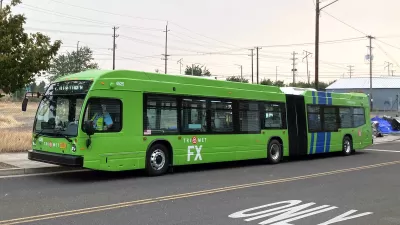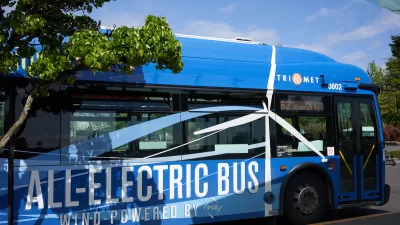The Tri-County Metropolitan Transportation District of Oregon plans to restore pre-pandemic service, expand its light rail lines, and move toward an all-electric bus fleet.

The Tri-County Metropolitan Transportation District of Oregon (TriMet) announced its budget for the fiscal year starting on July 1, which “includes $748.9 million in day-to-day operating requirements and $304.1 million in capital improvements. For the tenth straight year, the budget does not include a base fare increase.” Tia York, writing on behalf of the agency, highlights planned improvements. The article notes that “TriMet would need to increase our current operator ranks by more than 300 to return service to pre-pandemic levels,” but the agency is raising operator pay in an effort to recruit more drivers and restore and expand service.
“One of the big improvements our riders will see in the coming months is the launch of the first TriMet FX™--or Frequent Express–bus service, coming this fall to the 15-mile Division Street corridor, between Gresham and Downtown Portland. FX 2-Division will bring more people on board using longer, articulated buses that will allow for faster, all-door boarding and special signal and lane markings to help keep buses moving past traffic congestion.”
The agency will also replace its light rail vehicle fleet, extend the MAX Red Line, and renovate a facility to prepare for an electric bus fleet. “In April, TriMet announced the purchase of 24 long-range battery electric, zero-emissions buses from California-based bus manufacturer GILLIG. They will begin arriving in fall 2023 and more than double the size of TriMet’s fleet of 100% battery-electric buses to include some 35 vehicles.”
FULL STORY: Restoring workforce, improving service, adding electric buses priority in TriMet’s adopted budget

Alabama: Trump Terminates Settlements for Black Communities Harmed By Raw Sewage
Trump deemed the landmark civil rights agreement “illegal DEI and environmental justice policy.”

Study: Maui’s Plan to Convert Vacation Rentals to Long-Term Housing Could Cause Nearly $1 Billion Economic Loss
The plan would reduce visitor accommodation by 25% resulting in 1,900 jobs lost.

Planetizen Federal Action Tracker
A weekly monitor of how Trump’s orders and actions are impacting planners and planning in America.

Wind Energy on the Rise Despite Federal Policy Reversal
The Trump administration is revoking federal support for renewable energy, but demand for new projects continues unabated.

Passengers Flock to Caltrain After Electrification
The new electric trains are running faster and more reliably, leading to strong ridership growth on the Bay Area rail system.

Texas Churches Rally Behind ‘Yes in God’s Back Yard’ Legislation
Religious leaders want the state to reduce zoning regulations to streamline leasing church-owned land to housing developers.
Urban Design for Planners 1: Software Tools
This six-course series explores essential urban design concepts using open source software and equips planners with the tools they need to participate fully in the urban design process.
Planning for Universal Design
Learn the tools for implementing Universal Design in planning regulations.
Caltrans
Smith Gee Studio
Institute for Housing and Urban Development Studies (IHS)
City of Grandview
Harvard GSD Executive Education
Toledo-Lucas County Plan Commissions
Salt Lake City
NYU Wagner Graduate School of Public Service




























